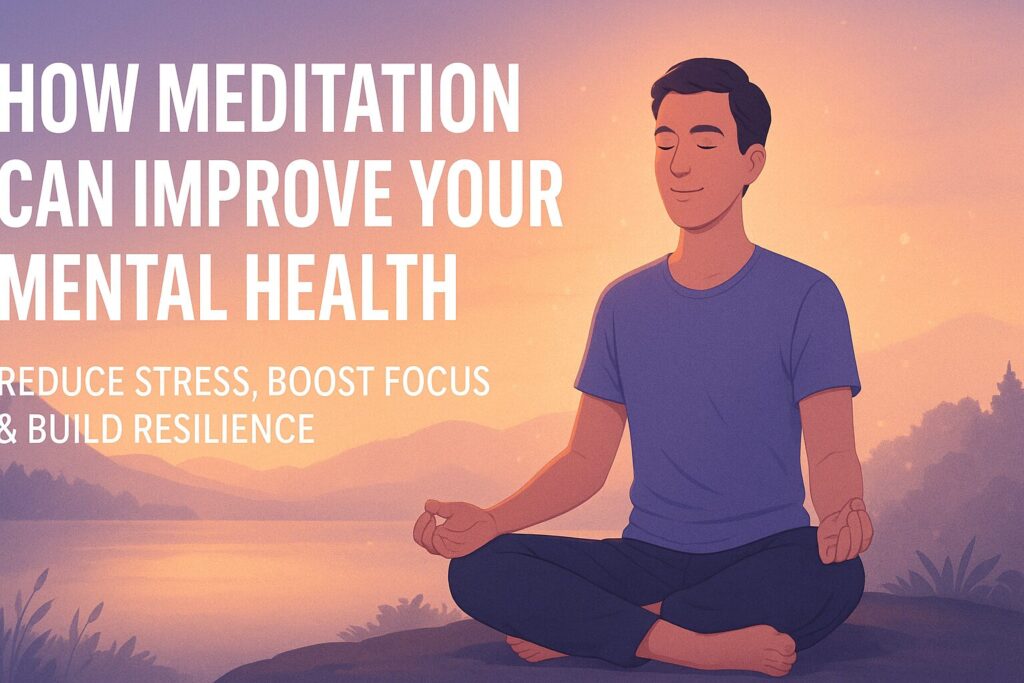Discover how meditation can boost your mental health by reducing stress, improving focus, and building emotional resilience backed by science and real stories.
Table of Contents
What Is Meditation? A Simple Introduction
Meditation is a mental practice that involves focusing your attention and eliminating the stream of thoughts that may be crowding your mind. Rooted in ancient traditions, especially from Hinduism and Buddhism, meditation has evolved over time and is now widely used as a secular method to promote mental clarity and emotional calmness.
At its core, meditation is about training the mind to become more aware and present. This is often achieved by concentrating on a specific object, thought, or activity like your breath, a mantra, or even bodily sensations. Through regular practice, meditation helps create a state of relaxation and inner peace.
Modern science supports the idea that meditation is not just spiritual it has practical mental health benefits. It can decrease stress, lower anxiety, improve focus, and enhance emotional well-being. Even short sessions of 5 to 10 minutes a day can start to make a difference.
Meditation is also incredibly flexible. Whether you’re sitting in silence, walking slowly, or listening to a guided voice, the goal remains the same: becoming more present and connected with your thoughts in a non-judgmental way.
In essence, meditation is like a workout for your mind. Just as physical exercise strengthens your body, meditation strengthens your mental and emotional resilience a key factor in improving overall mental health.
The Science Behind Meditation and Mental Health
Scientific research has increasingly validated what ancient practitioners have known for centuries meditation offers measurable benefits for mental health. When we meditate, our brain undergoes real and observable changes that contribute to emotional stability and psychological well-being.
One of the key findings is that meditation activates the prefrontal cortex, the part of the brain responsible for decision-making, concentration, and emotional regulation. At the same time, it helps calm the amygdala, the brain’s stress and fear center. This balance reduces the body’s “fight-or-flight” response and promotes a sense of calm.
Moreover, regular meditation has been shown to reduce the levels of cortisol, the primary stress hormone. Lower cortisol levels are linked to decreased anxiety, better sleep, and improved mood. Meditation also increases the production of serotonin and dopamine, which are neurotransmitters associated with happiness and well-being.
Studies using MRI scans have found that long-term meditators show increased gray matter density in areas of the brain linked to memory, empathy, and emotional regulation. This means meditation may literally rewire your brain in a way that supports better mental health.
In short, meditation doesn’t just feel good it has real, proven biological effects. It’s a low-cost, side-effect-free tool that can complement other mental health treatments or even serve as a proactive strategy to maintain emotional balance.
How Meditation Reduces Stress and Anxiety
One of the most well-known benefits of meditation is its powerful ability to reduce stress and anxiety. In our fast-paced lives, stress often builds up due to constant stimulation, worry, and mental overload. Meditation helps break this cycle by teaching the mind to slow down and return to the present moment.
When you meditate, you activate the parasympathetic nervous system, also known as the “rest and digest” mode. This counters the sympathetic nervous system, which triggers the body’s stress response. As a result, your heart rate slows, breathing becomes deeper, and tension in the body starts to ease.
Meditation also trains the mind to observe anxious thoughts without reacting to them. Through mindfulness practices, you learn to acknowledge thoughts and feelings without judgment a technique that reduces their emotional impact. Over time, this can lead to fewer episodes of intense worry and better coping mechanisms during stressful situations.
Additionally, daily meditation lowers the levels of cortisol, the hormone responsible for many of the physical symptoms of stress like muscle tension, headaches, and fatigue. Even just 10–15 minutes a day can produce noticeable changes.
In essence, meditation creates a safe mental space where your mind can pause, reset, and let go of anxiety. It doesn’t eliminate stressors from your life, but it changes how you respond to them making you calmer, clearer, and more in control.
Meditation for Depression: Can It Really Help?
Depression often brings a heavy mix of sadness, hopelessness, and negative thought patterns. Meditation, particularly mindfulness meditation, offers a gentle yet effective way to manage and even reduce these symptoms. While it’s not a replacement for professional treatment, it can be a powerful complementary practice.
One of the biggest challenges in depression is getting stuck in rumination repetitive negative thoughts about the past or the self. Meditation teaches individuals to become aware of their thoughts without attaching judgment or emotion to them. This awareness breaks the cycle of rumination, helping the mind become more present and less dominated by harmful thoughts.
Research shows that meditation increases activity in the prefrontal cortex, the part of the brain responsible for mood regulation, while decreasing activity in the default mode network, which is associated with self-referential thoughts and worry. This neurological shift supports a more balanced emotional state.
Meditation also promotes self-compassion, which is especially important for those struggling with feelings of guilt or low self-worth common symptoms of depression. By simply observing and accepting one’s inner experience, meditation cultivates kindness toward the self, a crucial step in healing.
Many therapists today incorporate Mindfulness-Based Cognitive Therapy (MBCT) into their treatment plans for depression, and results have been promising. With consistency and patience, meditation can lift the mental fog and provide a sense of lightness and clarity.
Boosting Focus and Concentration Through Meditation
In a world full of distractions, maintaining focus has become more difficult than ever. Meditation offers a practical solution to this problem by training the brain to stay present and improve concentration over time. Regular practice has been shown to sharpen attention span, reduce mental wandering, and boost overall cognitive performance.
One of the primary forms of meditation for improving focus is concentration meditation where you focus on a single object like your breath, a candle flame, or a mantra. Each time your mind drifts, you gently bring it back. This simple act of refocusing strengthens your attentional control, much like lifting weights builds muscle.
Neuroscientific studies have found that meditation increases gray matter density in areas of the brain responsible for attention and memory, particularly the anterior cingulate cortex and hippocampus. This not only enhances short-term focus but also supports long-term memory and learning capacity.
Meditation also helps reduce mental clutter, the background noise of overthinking and unnecessary worries. With a clearer mind, it becomes easier to stay on task, make decisions, and retain information.
In just a few weeks of consistent practice even as little as 10 minutes a day people often notice better productivity, less procrastination, and a heightened ability to complete tasks without getting sidetracked.
Simply put, meditation gives your mind a much-needed mental “reset,” allowing you to direct your attention where it matters most.
Meditation and Emotional Resilience
Emotional resilience is the ability to bounce back from challenges, stress, and emotional turmoil and meditation is a powerful tool to build this inner strength. Rather than avoiding or suppressing difficult emotions, meditation teaches you to observe them calmly and without judgment, which is a key trait of emotionally resilient people.
One way meditation supports resilience is by increasing self-awareness. When you’re more aware of your thoughts and emotional patterns, you’re less likely to be overwhelmed by them. This allows you to respond thoughtfully instead of reacting impulsively, especially during stressful or emotionally charged situations.
Meditation also strengthens the brain regions involved in emotional regulation, such as the prefrontal cortex and the insula. These areas help you manage emotions more effectively, even in the face of adversity. With regular practice, you may find yourself more patient, understanding, and less easily triggered.
Another major benefit is the development of equanimity a calm mental state even during discomfort or change. This helps in accepting situations that are beyond your control, a key aspect of resilience.
By fostering mindfulness, meditation encourages you to live in the present moment rather than dwell on the past or worry about the future. This mindset helps build confidence, clarity, and the mental flexibility to adapt and move forward during life’s ups and downs.
In short, meditation doesn’t eliminate problems it empowers you to face them with a steadier heart and a clearer mind.
Sleep Better: Meditation’s Role in Restful Nights
Sleep and mental health are deeply connected, and poor sleep often worsens anxiety, stress, and depression. Meditation can be a natural remedy for sleep issues, helping you fall asleep faster, stay asleep longer, and wake up feeling more refreshed. It creates a calm mental environment that’s essential for deep, restorative rest.
One of the biggest barriers to good sleep is an overactive mind racing thoughts, worries, or replaying the day’s events. Meditation slows down these thoughts by shifting your focus inward and guiding the body into a relaxed state. Practices like guided meditation, body scans, and mindful breathing can help transition the mind from alertness to restfulness.
Meditation also activates the parasympathetic nervous system, which slows the heart rate and promotes relaxation. This reduces stress hormone levels such as cortisol and adrenaline, making it easier for the body to settle into sleep.
Scientific studies have shown that regular meditation can increase melatonin production, the hormone responsible for regulating sleep cycles. It also helps improve sleep quality by reducing symptoms of insomnia, especially in individuals with anxiety and depression.
Establishing a short meditation routine before bed even just 10 minutes can signal to your body and mind that it’s time to wind down. Over time, this ritual can become a powerful sleep aid that enhances both your mental and physical health.
In summary, meditation creates the mental stillness your body craves for better sleep naturally and without side effects.
Different Types of Meditation for Mental Health
Meditation isn’t a one-size-fits-all practice. There are several styles, each offering unique benefits for improving mental health. Understanding the different types allows you to choose the one that best fits your needs, personality, and lifestyle.
1. Mindfulness Meditation:
This is the most popular form and focuses on staying aware of the present moment. You observe your thoughts, feelings, and bodily sensations without judgment. It’s especially effective for reducing stress, anxiety, and overthinking.
2. Loving-Kindness Meditation (Metta):
This practice involves sending feelings of love, compassion, and goodwill to yourself and others. It helps build emotional resilience, reduce anger, and improve relationships making it great for people dealing with self-criticism or depression.
3. Body Scan Meditation:
In this method, you bring attention to different parts of your body, noticing tension and relaxing each area. It’s often used for stress relief and grounding, helping calm both the mind and body before sleep.
4. Transcendental Meditation:
This technique uses silently repeated mantras to transcend ordinary thought. It’s known for reducing stress, improving focus, and providing deep rest. It’s structured and often taught through certified programs.
5. Guided Meditation:
Ideal for beginners, this involves following an instructor’s voice, often through apps or recordings. It can be themed around relaxation, healing, sleep, or focus.
6. Walking Meditation:
Perfect for those who struggle to sit still, this involves slow, mindful walking while focusing on your steps and breath.
Each type offers a path to mental clarity and emotional healing. Experiment with different styles to find the one that resonates most with your needs.
How to Start a Meditation Practice for Mental Wellness
Starting a meditation practice can feel intimidating at first, but it’s actually simple and accessible to everyone no special equipment or prior knowledge required. The key is to start small, be consistent, and remain patient with yourself.
Choose a quiet, comfortable space where you won’t be disturbed. Sit or lie down in a relaxed position, close your eyes, and bring your attention to your breath. Don’t worry if your mind wanders that’s completely normal. The practice of gently bringing your focus back to the breath is where the real benefit lies.
For beginners, it’s recommended to start with just 5 to 10 minutes a day. You can gradually increase the duration as you get more comfortable. There are many free meditation apps like Insight Timer, Calm, or Headspace that offer guided sessions to help you get started.
Consistency matters more than duration. Meditating every day even briefly helps you build a habit and train your brain over time. Set a regular time that works for you, such as after waking up or before going to bed.
Also, don’t expect immediate results. Meditation is a long-term practice that gently rewires your brain and emotional responses. Some days will feel easy, while others may feel restless and that’s okay.
Most importantly, approach meditation with kindness and curiosity. It’s not about clearing your mind or doing it perfectly it’s about becoming more aware, calm, and connected to yourself.
Real-Life Success Stories: Mental Health Improvements Through Meditation
While scientific studies validate the benefits of meditation, real-life stories often illustrate its true impact in the most relatable way. Many people from different walks of life have experienced profound changes in their mental health through consistent meditation.
Sarah, a 28-year-old teacher, struggled with chronic anxiety and panic attacks. After trying medication and therapy with limited success, she began practicing mindfulness meditation for 15 minutes each day. Within a few weeks, she noticed fewer episodes of anxiety and felt more grounded. Over time, meditation became her safe space helping her respond calmly to stress and rebuild confidence.
Ravi, a 40-year-old business executive, was dealing with burnout and insomnia due to constant work pressure. He adopted a guided sleep meditation routine and gradually restored his sleep cycle. As his rest improved, so did his productivity and emotional well-being. Meditation helped him detach from overthinking and find balance between work and life.
Aisha, a college student battling depression, found strength through loving kindness meditation. By sending compassionate thoughts to herself and others, she learned to let go of self-criticism and cultivate a more positive self-image. Her mood improved, and she became more emotionally resilient during difficult semesters.
These stories reflect a common theme: meditation doesn’t erase life’s problems, but it transforms how people experience and respond to them. Whether it’s managing anxiety, overcoming depression, or simply feeling more centered, meditation has empowered many to take control of their mental wellness one breath at a time.



